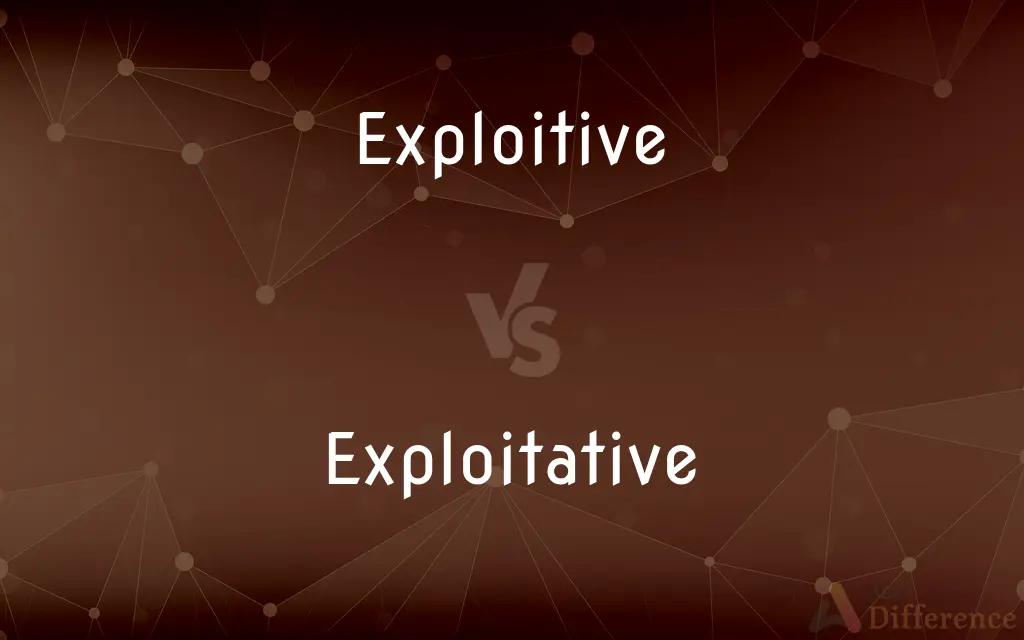Exploitive vs. Exploitative — What's the Difference?
By Tayyaba Rehman & Fiza Rafique — Updated on April 8, 2024
Exploitive refers to using situations for unfair advantage, while exploitative emphasizes unethical or immoral use of others.

Difference Between Exploitive and Exploitative
Table of Contents
ADVERTISEMENT
Key Differences
Exploitive is an adjective describing actions or policies designed to take advantage of situations or people, often for personal gain or efficiency. On the other hand, exploitative also describes taking unfair advantage of others, but with a connotation that stresses the unethical, immoral, or abusive aspect of such behavior.
Both terms relate to the act of exploitation, where resources or individuals are used for selfish benefit. However, exploitative is more commonly used in contexts emphasizing the moral or ethical implications of exploitation, particularly in relation to labor and human rights.
In terms of usage, exploitive might appear in more general or neutral contexts, where the focus is on the act of using resources or situations to one’s advantage, without a heavy emphasis on the morality of the action. Whereas exploitative is more likely to be found in discussions about social, economic, and ethical issues, highlighting the negative impact on those being exploited.
The choice between exploitive and exploitative often depends on the speaker’s or writer’s intent to highlight the ethical dimensions of the exploitation. If the intent is to underscore the immorality or the abusive nature of the action, exploitative is the preferred term.
Despite their nuances, in many contexts, the terms can be used interchangeably without significant loss of meaning. The preference for one over the other can also reflect regional differences in English usage or the specific connotations a writer wishes to convey.
ADVERTISEMENT
Comparison Chart
Definition
Using situations for personal gain or efficiency
Using others in an unethical or immoral way
Connotation
Often neutral or focused on advantage
Emphasizes unethical, immoral, or abusive aspects
Common Usage
General or neutral contexts
Discussions on social, economic, and ethical issues
Focus
Efficiency or advantage
Ethical implications of exploitation
Interchangeability
Sometimes interchangeable
Preferred in contexts highlighting negative impacts
Compare with Definitions
Exploitive
Focused on efficiency or benefit.
His approach was criticized as being too exploitive of the current market trends.
Exploitative
Using others unethically for personal gain.
The documentary exposed the company's exploitative labor practices.
Exploitive
Relating to taking advantage of situations.
The company's exploitive tactics boosted profits but harmed its reputation.
Exploitative
Common in discussions of rights and justice.
The new laws aim to curb exploitative work contracts.
Exploitive
Taking advantage without necessarily implying immorality.
The app was designed to be exploitive of gaps in the existing services.
Exploitative
Emphasizes abuse or misuse.
The exploitative relationship between the corporation and its suppliers came under scrutiny.
Exploitive
Utilizing resources to the fullest.
The novel was notable for its exploitive use of historical events for dramatic effect.
Exploitative
Implies a moral or ethical judgment.
The film was criticized for its exploitative portrayal of vulnerable communities.
Exploitive
Often used in business or strategy contexts.
Their business model was inherently exploitive, focusing on maximizing output.
Exploitative
Focused on the negative impact on the exploited.
Activists condemned the exploitative nature of the gig economy.
Exploitive
An act or deed, especially a brilliant or heroic one. ]
Exploitative
An act or deed, especially a brilliant or heroic one. ]
Exploitive
Exploitative: taking advantage of someone
Exploitative
In the nature of exploitation; acting to exploit someone or something
We are protesting the company's exploitative policies.
Exploitive
Tending to exploit or make use of.
Exploitative
(more generally) Of or relating to exploitation.
Exploitive
Tending to exploit or make use of
Exploitative
Wherein one organism reduces a resource to the point of affecting other organisms.
Exploitative
Tending to exploit or make use of
Common Curiosities
What does exploitative mean?
Exploitative describes taking unfair advantage of others, emphasizing the unethical, immoral, or abusive aspects of such behavior.
What does exploitive mean?
Exploitive refers to actions or policies that take advantage of situations or people, often for personal gain or efficiency.
What is the main difference between exploitive and exploitative?
The main difference lies in the connotation: exploitative emphasizes the unethical or immoral use of others, while exploitive is often neutral or focuses on advantage.
How do I know if something is exploitive or exploitative?
Evaluate the context: if the emphasis is on ethical or moral implications, it's likely exploitative. If it's about advantage or efficiency without a strong ethical judgment, it might be exploitive.
Are exploitive and exploitative interchangeable?
While often used interchangeably, exploitative is preferred in contexts that highlight the unethical or abusive nature of exploitation.
When should I use exploitive instead of exploitative?
Exploitive can be used in more general or neutral contexts, where the focus is on the act of utilizing resources or situations to one’s advantage.
Is the use of exploitive or exploitative preferred in academic writing?
Academic writing tends to prefer "exploitative" when discussing ethical issues, though usage can vary depending on the specific context.
Is exploitative always negative?
Yes, exploitative is typically used in a negative context, highlighting unethical, immoral, or abusive actions.
Can a business model be inherently exploitative?
Yes, a business model can be inherently exploitative if it relies on unfair, unethical, or abusive practices for success or profit.
Are there laws against exploitative practices?
Yes, many countries have laws designed to protect individuals and communities from exploitative practices, especially in the workplace.
How can one avoid being exploitative in business?
Adopting fair trade practices, ensuring ethical treatment of workers, and engaging in corporate social responsibility are ways to avoid being exploitative.
Can a policy be considered both exploitive and exploitative?
Yes, a policy can be considered both exploitive and exploitative if it takes advantage of situations or people for benefit while also being unethical or immoral.
Why is it important to distinguish between exploitive and exploitative?
Understanding the distinction can help in accurately describing actions or policies, especially when discussing their ethical or moral implications.
Does the media use both terms correctly?
The media may use both terms, but accuracy can vary depending on the context and the specific message being conveyed.
Does the distinction between exploitive and exploitative matter in everyday conversation?
While the distinction may not always be crucial in casual conversation, understanding the difference can enhance clarity and precision in communication.
Share Your Discovery

Previous Comparison
Mime vs. Clown
Next Comparison
Moderate vs. MildAuthor Spotlight
Written by
Tayyaba RehmanTayyaba Rehman is a distinguished writer, currently serving as a primary contributor to askdifference.com. As a researcher in semantics and etymology, Tayyaba's passion for the complexity of languages and their distinctions has found a perfect home on the platform. Tayyaba delves into the intricacies of language, distinguishing between commonly confused words and phrases, thereby providing clarity for readers worldwide.
Co-written by
Fiza RafiqueFiza Rafique is a skilled content writer at AskDifference.com, where she meticulously refines and enhances written pieces. Drawing from her vast editorial expertise, Fiza ensures clarity, accuracy, and precision in every article. Passionate about language, she continually seeks to elevate the quality of content for readers worldwide.













































